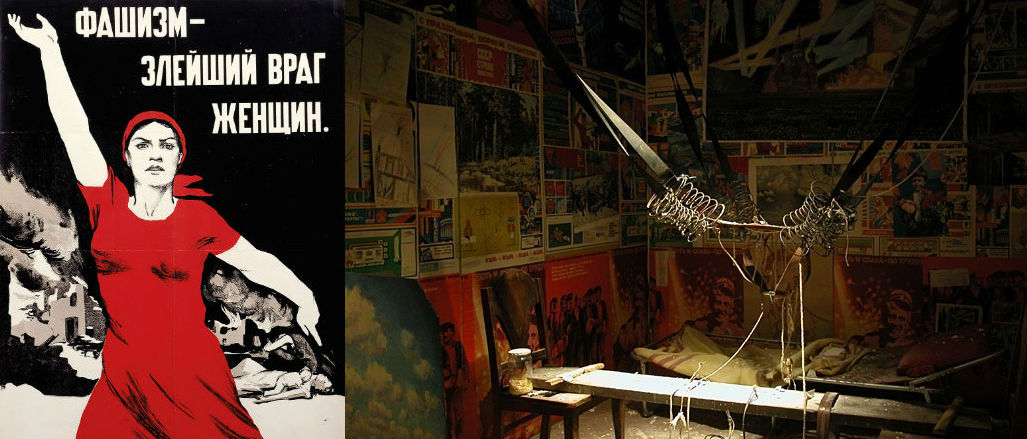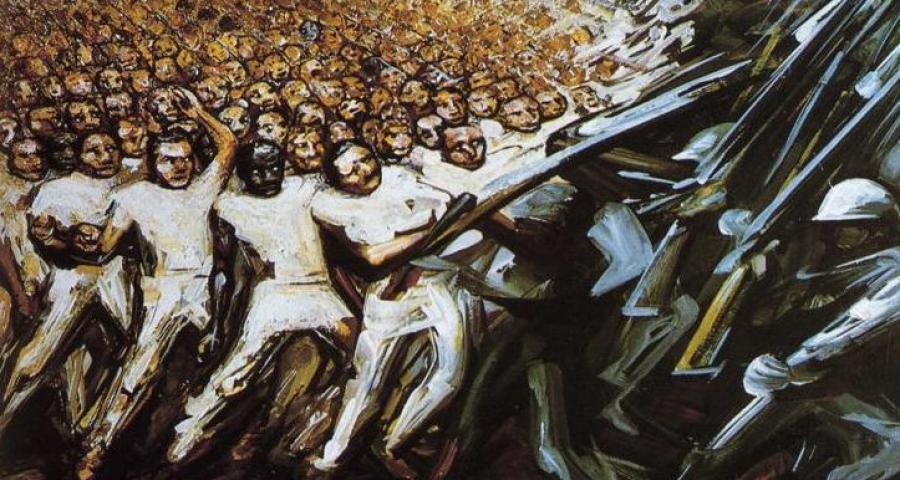We are born. It should be a start, but it is in fact a non-start; for we almost immediately have our full agency and autonomy as human beings robbed from us. We spend a lifetime trying to grasp it back from beneath a growing pile of rubble.
Rubble is literally at the center of Ilya Kabakov’s Labyrinth (My Mother’s Album). A large installation among many included in the Tate Modern’s exhibition of Ilya and Emilia Kabakov’s work, it is a spiral of long hallways reminiscent of Soviet era communal apartment buildings.
Read moreSome things, once said, can't ever be unsaid.
Some spells, once chanted, cannot be unmade,
but spark, leap over silicon barricades,
cast afterimages of brilliant red.
The spell creates the wizard. There lies he,
babe rocked by engines, watched through robot eyes,
his cradle hung from cables to the sky,
lulled fast asleep by steam trains to the sea.
Read moreAt 9:40pm on October 25th, the forecastle gun of the battleship Aurora fired an ear-shattering round into the air. It was a blank, an empty shell. One-year prior, the Aurora had been contributing to the carnage of World War I, patrolling and bombarding in service to the Russian Empire. Now it was docked in Petrograd and under the control of a revolutionary sailors’ committee, most of whom supported the Bolsheviks. The blank round was, so the story goes, the first shot in the October Revolution, which overthrew the Provisional Government and established the first workers’ state in history.
Read moreWhat is the relationship between artistic movements and the historical periods during which they first appeared? Can the methods associated with these movements be detached from their original context for the benefit of later artists? Do the answers to these questions depend on which movements and periods we are discussing? The issue is of more than academic interest. Serious contemporary artists want to produce work relevant to, and critical of the societies in which they live; but in doing so, are they free to draw on any methods, from any point in history, or will only some be adequate to their needs? Should socialists expect them only to work with particular methods, and criticise them when they do not?
Read morea cap of night
cold and icy swept by tangles of wire
and rickets
the unsettled courses the many empty hands
of the workers leaving empty factories
forever
Read more“Leveler” was coined in the 17th century to describe those who tore down hedges in the Enclosure Act Riots. It was later generalized. As long as the working-classes have sought political and economic leveling these aspirations have been expressed in art and culture – from the social gospel of Matthew to the gestures of punk and early Hip Hop. Aesthetic leveling can be used in ways that divert class anger toward the wrong targets or toward personalized solutions. But it also can express movement toward proletarian consciousness. And the socially promiscuous artist – coming from, and historically mixing with, all classes – is often predisposed toward leveling (as well as a political volatility that produces the aforementioned variations).
Read more“No one today can reasonably doubt the existence or the power of the spectacle; on the contrary, one might doubt whether it is reasonable to add anything on a question which experience has already settled in such draconian fashion.” – Guy Debord, Comments on the Society of the Spectacle, 1989
Within five years of writing these lines, Guy Debord – author, filmmaker, and leader of a coterie of radical intellectuals known as the Situationist International – despairing at the ever quickening advance of the society he opposed, brought his own life to an end. He had lived long enough to see the collapse of the bipolar world order of the Cold War and the Americanization of the world.
Read moreThere are different methods of celebrating an anniversary. There is that which looks back with pure nostalgia; a soft, uncritical reification that half expects time to repeat itself. It is safe to say that the vast majority of anniversaries are celebrated in such a way.
Then there is the method of commemoration that looks forward, that intrinsically understands history as a constant process, unfolding in this way or that depending on who pushes, who is pushed, and whether they are willing to push back. Not events as blueprints, but as ruptures and openings though which we can see a different future.
Read moreWhen I was a kid, I read a spoof in a nickelodeon about what it was like to watch a World War Two film with a German Shepherd. The punchline was that the dog always rooted for the wrong side. Viewing Hulu’s adaptation of Margaret Atwood’s 1985 sci-fi novel, The Handmaid’s Tale, I couldn’t help but to think of all the viewers who were sharing a sofa with friends, family, and lovers, who, openly or not, may view Gilead, the theocratic, dystopic, man-scape setting for the story, with a palate falling well short of the distaste intended by the filmmakers.
Read moreThe opening page of War Primer contains a short, four-line poem:
Like one who dreams the road ahead is steep
I know the way Fate has prescribed for us
That narrow way towards a precipice.
Just follow. I can find it in my sleep.
Read moreDenis Villeneuve’s Blade Runner 2049 is the much-anticipated sequel to the 1982 cult film directed by Ridley Scott. Like the original, 2049 is a visually stunning depiction of our potential dystopian future; one that if we read it in its historical context provides for us a detailed cognitive mapping of the continued decline of unfettered multinational capitalism. Also, like the original, the new film provides a surface level portrayal of the world that, if read in spatial terms, maps for us many of the contours of the rhizomatic networks of contemporary capital...
Read moreRed Wedge will be presenting two panels at this year's Historical Materialism London conference. This year's conference takes place at the confluence of three auspicious anniversaries: the 20th anniversary of the HM journal, the 150h anniversary of the publication of Marx's Capital, and the 100th anniversary of the Russian Revolution.
It is no surprise to anyone familiar with Red Wedge that we share HM's commitment to Marxism's reinvention and rediscovery. Which is why we are glad to be contributing these panels, dedicated to a creative and critical assessment of the Marxist aesthetic experience.
Read moreThere’s something strange about the strange – and unpacking that something is the task Mark Fisher sets himself in this lucid little book. The Weird and the Eerie marshals a series of essays into a sharp theoretical intervention, argued tightly and packed tersely into 120 pages.
Specifically: there are two distinct modes of the strange – the weird and the eerie – and this distinction revolves around the different ways they deal with exteriority. The weird involves an irruption of the out-there in here: “the weird is that which does not belong”, hence its close affinity with fantastic fiction.
Read moreIt has been a century since the Russian Revolution. The occasion has naturally provoked all manner of commemorations. The establishment calls it an unfortunate sequence of events never to be repeated, the right spits its vicious bile at the memory of a workers’ world, and the Left, to one degree or another, celebrates and analyzes and tries to ask how to make the history come alive again. How to make the dream of total liberation, of workers power and radical democracy, into a reality.
Read moreBarred temptations is how secrets begin
Erratic desires to seize his prize
Pushes him to conspire from within
Now, a friend, and admired in her eyes
Slyly he fills the post of absent love
Easily ‘cause Absentee was ten years
Read moreAt some point or another, every artist ponders their purpose. Do they matter? To whom and in what way? What does it even mean to be relevant? And as the world changes quickly, will their art, their music, their words, continue to have an impact?
Algiers consciously ask these questions of themselves, and are constantly aware that doing so both is and requires a struggle. One of the things that makes them such a notable act is that their consciousness of this both ideologically and structurally.
Read moreIt’s about time. Not the obvious reaction when one of your heroes dies. But Holger Czukay was all about time. Not just in the sense, as Can’s bass player, of playing in time, though few could better that Czukay (just listen to “One More Night”), but in the sense of sequencing time: ordering and shaping it, as an editor. Between the two approaches, his two roles, Czukay created a sense of time speeding up, time slowing down, time as an elastic, malleable essence. Working against the regulation, the containment of capitalist time. But Holger Czukay is all about time in another sense. Due to both forming a band late – in his thirties – and dying relatively late in musician terms, Czukay’s life spanned a huge stretch of history and culture.
Read moreRed Wedge is proud to be contributing to the organizing of the very first Montreal Historical Materialism Conference. Held from May 17-20, it is a bilingual conference, and an excellent chance to break down barriers between English and French speaking activists and scholars. The them of the conference is ambitious: “The Great Transition,” reflecting a sorely needed optimism but also rooted in practical and sober theory.
Read moreThe Struggalo Circus, a group of radical activists who are also dedicated fans of Insane Clown Posse and Psychopathic Records, were finishing their preparations before we headed to the Juggalo March. The four (nom de guerres: Ape, Dimension, Kitty Stryker, and RaiderLo) had split a hotel room in Chinatown, waking up early to don their regalia. Ape, his fully made-up face framed by bleached blonde hair and beard, looked oddly appropriate for the juggalos’ leap into DC protest politics: he wore a suit. “I dress like this all the time,” he told me. During the day he fielded at least a dozen interviews.
Read moreWelcome to Dumpster Pizza Party: a podcast about art and DIY counter-culture with your host Craig E. Ross...
My guest today is VHS Girl, as known as the artist and tape-head Katie Winchester. In this podcast we discuss VHS Girl’s artistic journey from VHS collecting to creating paintings of her favorite VHS covers and becoming heavily involved in the DIY outsider art world. We also discuss the Solar Eclipse Comic-Con in Carbondale, IL that we both had the pleasure of participating in as well as movies, breakfast food, nerd culture, and the history of resistance against the KKK.
Read more
















